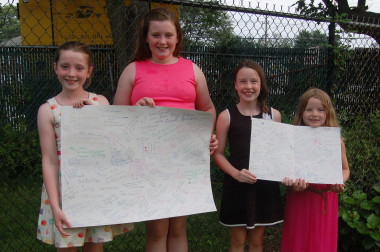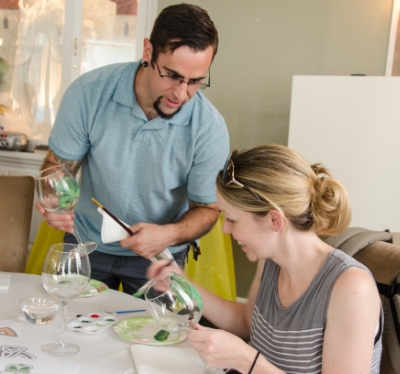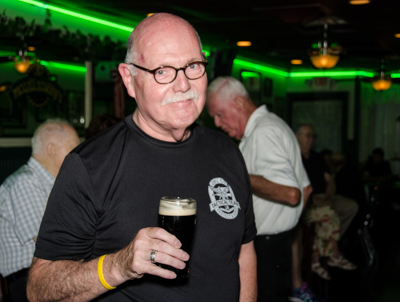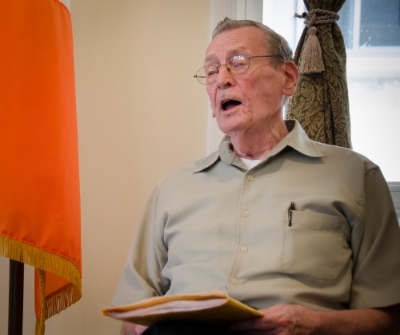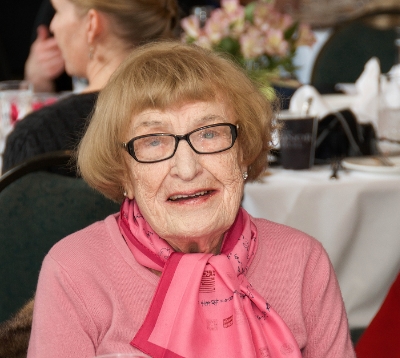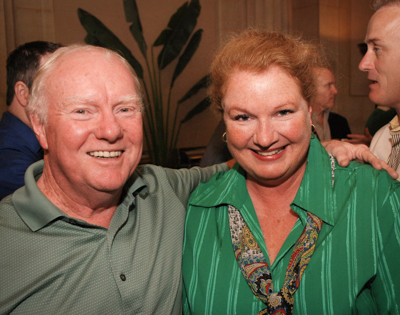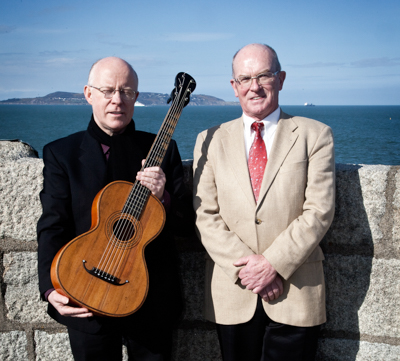When Bob McLaughlin was signing the visitor book at St. Ignatius Nursing Home in Havertown one day not long ago, he said he couldn’t help paging through the list of the people who had come to visit his brother, Jim, who was dying of a malignant brain tumor.
“There were hundreds and hundreds of names,” he told the more than 100 people who gathered in the St. Joseph University Chapel on Tuesday morning to say goodbye to Jim McLaughlin, who died on July 24, just 8 months after his diagnosis.
“There were so many, the man sitting behind the desk said to me, ‘Is he an important guy?’ “ Bob McLaughlin paused. “I said, ‘Yes he is.’”
Over the next 20 minutes, Bob McLaughlin made it clear that he wasn’t referring to anything on his brother’s resume, though it was impressive. Despite his diminutive size, Jim McLaughlin was a wide receiver for Drexel Hill’s Msgr. Bonner High School team. He remained a Bonner booster all his life, becoming part of the Bonner “Mafia” that helped another Bonner grad, Bill McLaughlin (no relation), start the Irish American Business Chamber and Network in 1999. “He really helped me enormously in those early days,” recalled Bill McLaughlin. “He joined the board early on and started recruiting all the Bonner guys he knew to join. That’s how we started.”
He also stayed true to his college. Jim McLaughlin graduated in 1970 from St. Joseph’s University, where he was class president his first two years. A clue to his character: He abandoned the try at a third term after his mother died, leaving four of her seven children still at home, including the youngest, Mary, who was a toddler. When his family called, he dropped everything to be there for them, often, as many learned at his funeral, in exceptional ways.
He remained an avid Hawk supporter all his life— his AOL email address was Jimsju70 —at one point becoming co-chair (or, as Father Feeney described him, “communicator-in-chief”) of the Class of ’70 group. In April this year, he received the Hogan Award, which is given annually to recognize outstanding loyalty and service to the university.
He attended St. Joe’s on an Air Force ROTC scholarship, and after graduation became a second lieutenant in the Air Force stationed in Washington State, where he married and started a family. After his discharge, he got his masters of social work and worked in that field for a decade before translating those skills into a new career in healthcare recruitment and marketing.
He was an entrepreneur, opening his own consulting firm, Trinity Health Partners which provided recruiting and business development services to companies. He served as president of the Irish American Business Chamber and Network which fosters business relationships between Ireland and the US, and between Irish-Americans in Philadelphia. In fact, he had just returned home from a trip to Ireland with a group of hospital execs interested in expanding their virtual pediatric medical services to Irish medical centers when he was diagnosed.
But what his brother Bob was alluding to was not the typical accomplishments of a smart and successful businessman. People did not remember Jim for his “resume virtues,” said his college friend Kyran Connor, quoting an essay by New York Times columnist David Brooks on what it means to live a meaningful life. What made Jim McLaughlin an important man were his “eulogy virtues,” said Connor, again quoting Brooks, the ones “talked about at your funeral.” Those are the values and characteristics that allow some people to “radiate an inner light,” Brooks has written.
To those who knew him, Jim McLaughlin radiated a bonfire, often signaled by the twinkling light in his eye. He had such a zest for life and people, Father Joseph Feeney, SJ, the St. Joe’s professor who said the funeral Mass, started off the service addressing his old friend. “Jim,” he said, “you can’t not be alive. You’re too merry, too vital, too loveable to stop living. . . .He was the most open, loveable and kind people I have ever met, “ he told the mourners.
Many friends, like Connor, recalled a man who “could make you laugh so hard your sides would hurt.” Bill McLaughlin, who was a good foot or more taller than his friend, recalled Jim’s standard answer when people inevitably asked them if they were related. “ He used to say we were both from the same DNA pool but he was from the shallow end. He used to joke that he and I should have given a networking workshop to the chamber—and call ourselves the McLaughlin twins.”
They also remembered a man with myriad interests, one being Zydeco or Cajun folk dancing. “Jim was a genius at finding a Zydeco dance in Philadelphia and of the 7,000 Zydeco dancers in Philadelphia, I think there were only three who didn’t get to St. Ignatius to see him,” joked his brother Bob. “They loved my brother.”
They were far from alone. Jim McLaughlin collected people like some people collect matchbooks. He nurtured those relationships with unexpected phone calls, emails, and hugs. It was like him to “buy you drinks or dinner,” said Father Feeney. In business, it’s called networking, but for Jim McLaughlin, it was more like a genetic trait.
When his brother Bob, a flute player, became friends with virtuoso Irish flute player Kevin Crawford of the top traditional band, Lunasa, Crawford became Jim McLaughlin’s friend too. Crawford and Lunasa bandmate, noted piper Cillian Vallely, played at the service on Tuesday, opening with the poignant tune, “The Dear Irish Boy.” Afterwards, they remembered their friend whom they, like Bob, called “The Mayor.”
“Jim was an extremely special kind of guy. He would just call you out of the blue and say hello, how are you, when are you coming down, is there anything I can do for you,” recalled Crawford.
In fact, Crawford said, Jim McLaughlin would contact the venues where they were appearing to make sure the band was taken care of. “He knew everyone and had established such good will that they all owed him big time,” added Vallely. “If he asked you for something, you would have done it.”
Bethanne Killian got to know Jim McLaughlin better when she became more involved in the city’s Irish community. She’s chair of Irish Network-Philadelphia, a networking group. But she met him originally in 1995 when an Irish friend, Rose Shields, told her she wanted to introduce her to “this man she met on an airplane, coming into Philadelphia.” It was Jim. Shields and her husband Will chatted with him all the way from Shannon to Philly, then Jim offered them a ride home. “Of course, they became fast friends,” said Killian, laughing.
Along with collecting people, he connected them. Dublin-born Siobhan Lyons, executive director of the Irish Immigration Center of Greater Philadelphia, met Jim McLaughlin at a meeting of the Irish Chamber when she was looking for a job that would qualify her for a visa to allow her to stay in the US. She’d fallen in love with the city.
“Jim started introducing me to people. He told me to come to Judge Jimmy Lynn’s annual breakfast at the Plough and the Stars on St. Patrick’s Day where he introduced me to John O’Malley [on the Immigration Center’s Board of Directors]. He told John I was looking for a job and I saw John start to glaze over. Then I told him my background, that I had worked for the Irish government, and he said, ‘I think you’re the person we’ve been looking for.’ So it was thanks to Jim that I got my job and got to stay in the US.”
Frank Reynolds, CEO of PixarBio Corporation, had just learned how to walk again after a surgical error left him paralyzed for seven years when he met Jim McLaughlin. “I joined the Irish Chamber in 1999 after I was back to walking because I needed to network and make friends. I met Jim and we hit it off. We were both St. Joe’s grads and St. Joe’s had really helped saved my life. The research they gave me helped me literally get back on my feet. Jim introduced me to a lot of people, especially people in the neuroscience industry in Dublin, and I developed some important relationships that helped me develop a cure for paralysis.”
Reynolds’ invention, the NeuroScaffold, is an experimental polymer implant that provides support to injured spinal tissue and encourages healing. It has shown promise in clinical trials.
Though many recalled Jim McLaughlin’s “unbounded friendliness”—as Father Feeney put it—the truth is that the greatest of his “eulogy virtues” echoed the Jesuit principle that guides his beloved St. Joe’s: “In all things to love and to serve.”
After his mother died, his father also became ill, dying just a few years later, leaving little Mary an orphan at 10. But before his father passed away, Jim flew him and Mary out to Seattle then drove them in a VW bus for 1,000 miles to take them to Disneyland “which we now know to be the plot of the movie, ‘Little Miss Sunshine,’” said Mary, laughing. “We saw everything, the Pacific Coast Highway, Bug Sur, Napa. . . “
Then, when her father finally died, it was McLaughlin and his wife, Celeste, who took her into their home and raised her with their own two children, Suzanne and Kieran.
“Jim and Celeste were just 25, just married, and they raised me, an independent little girl who listened to her brother’s Allman Brothers albums, went bowling until midnight, and did whatever I wanted it,” Mary McLaughlin told the mourners about the man she called “my brother, my father, my friend.”
Her brother “changed the course of my life,” she said, by filling out her application for the University of Washington and submitting it, though she admitted she had other plans.
She echoed her brother, Bob, who credited “everything good about my life” to an afternoon he spent with Jim when he was living in Washington. That day, his nature-loving brother—Jim loved the outdoors was an avid member of the Appalachian Mountain Club– blew off his Air Force duties to take him to Mt. Rainier, the iconic snow-capped volcano in the Cascade range that dominates the horizon in Seattle and Tacoma.
“There we were, looking up at that 14,000 foot peak and over the Cascades and I thought, ‘I’m going to live here someday,” recalled Bob McLaughlin. “And in 1978 I quit my crazy sales job in Philly and moved to Tacoma to be near the mountains—and truthfully to be near my brother.”
Bob McLaughlin found a job in the textbook industry, which he remains in today, got married and started a family. “All of this came to me because of the gift my brother gave me in that trip to Mt. Rainier. That afternoon and the time and attention he gave me was life-changing. Everything good about my life was my brother’s gift.”
Jim McLaughlin leaves behind a daughter, Suzanne, and son, Keiran (Michelle) and a grandson, KJ. He is also survived by his siblings, Kathy, Tom (Fran), Bob (Nancy), Jerry, and Mary, and his fomer wife, Celeste. He was buried in Holy Cross Cemetery in Yeadon.
In lieu of flowers donations in his memory may be made to St Ignatius Nursing and Rehab, 4401 Haverford Avenue, Philadelphia, PA 19104 or to Visiting Nurses Association of Philadelphia, 3300 Henry Ave, Philadelphia, PA 19129.
[flickr_set id=”72157656153966089″]


